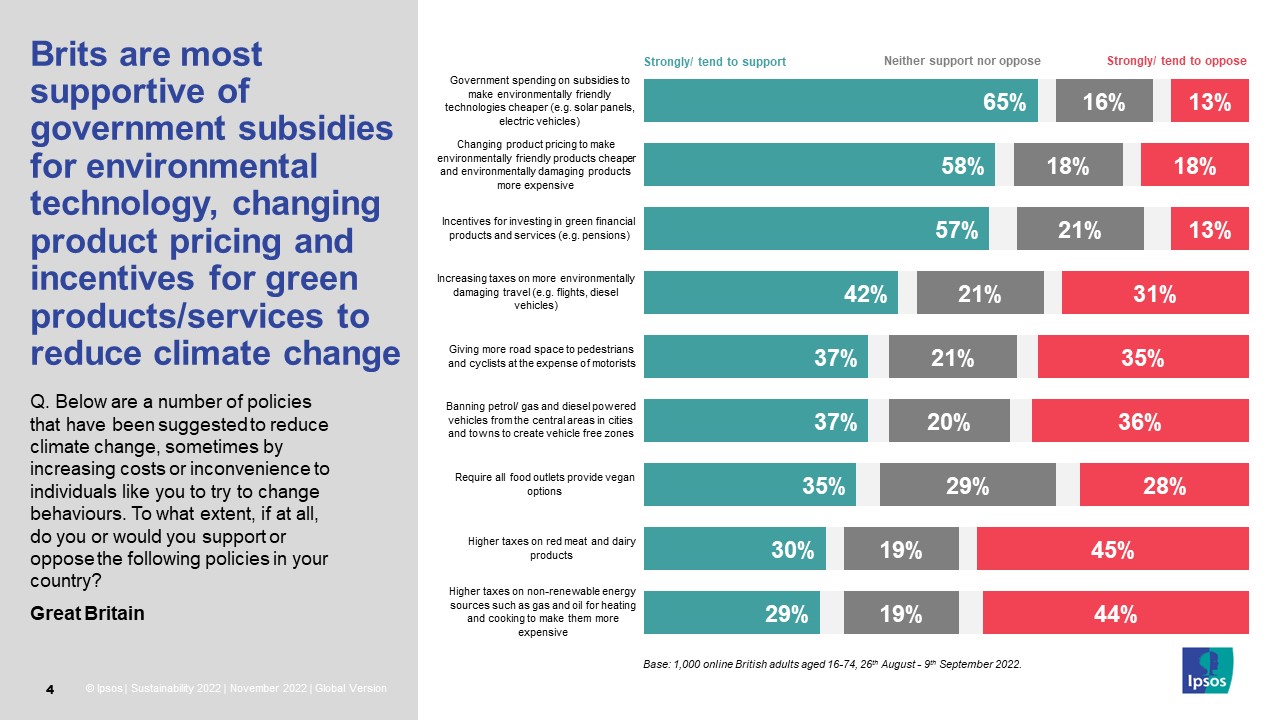Ahead of COP27, Britons want subsidies on environmentally friendly tech while few want higher taxes on non-renewable energy sources
As part of a global study covering 34 markets looking at citizen support for policies to help tackle climate change, British citizens are most likely to say they would support policies that apply incentivisation, discounting and other inducements rather than those which use taxation or reduced choice.
- The relative order of support for the various policies in Great Britain broadly reflects that of the global picture.
- The most popular policy of the nine tested was for government spending on subsidies to make environmentally friendly technologies cheaper (e.g., solar panels, electric vehicles), with almost two-thirds (65%) saying they would support this in Britain.
- Least popular policies were higher taxes on non-renewable energy sources such as gas and oil for heating and cooking to make them more expensive, supported by only 1 in 3 British citizens (29%) and higher taxes on red meat and dairy products that have a bigger carbon footprint (30%).
- When it comes to whose responsibility it is to educate the public on actions to combat climate change, British citizens clearly see that as the responsibility of government departments and ministers/elected officials (69%), ahead of scientists, local government, and media.
Support for specific policies to tackle climate change
- Almost two-thirds (65%) of citizens in Britain are willing to support government funding for new policies that will subsidies to make environmentally friendly technologies cheaper (e.g. solar panels, electric vehicles).
- Strong support was also given for changing product pricing to make environmentally friendly products cheaper and environmentally damaging products more expensive (58%) and Incentives for investing in green financial products and services (e.g., pensions) (57%).
- There is a notable drop-in support by British citizens for the other policies with Increasing taxes on more environmentally damaging travel (e.g., flights, diesel vehicles) only supported by 4 in 10 British citizens (42%)
- Lowest levels of support (29%) are seen for higher taxes on non-renewable energy sources such as gas and oil for heating and cooking to make them more expensive.

Whose responsibility is it to educate the public?
Ipsos observed that lack of action by citizens to engage in and change their behaviours towards having a smaller carbon footprint is often driven more by a lack of understanding than it is by lack of will/intent (i.e., the believe-true gap). This indicates the need for better education of citizens.
Almost 7 in 10 (69%) British citizens say in their opinion that it is the responsibility of government departments and ministers/elected officials to educate the public on the actions needed to combat climate change. This is one of the highest levels of agreement across the 34 markets where this survey was completed.
- More than a third of British citizens though that it was the responsibility of scientists (35%) and a third said local government (33%).
- A quarter (25%) said it was the responsibility of media.
- Less than 1 in 5 British citizens though it was the responsibility of other bodies (business and schools both 18%, environmental campaign/activist groups 12% and employers 10%).
We also see this in our Net Zero Living research, conducted with CAST as part of our climate engagement partnership. We see support for net zero policies among the British public drops when presented with personal lifestyle and cost implications. While combatting climate change is one reason why people may support net zero policies, other co-benefits around health, job creation or decreased costs are important motivators for support. This means policy makers need to understand and talk about these concerns, but also communicate about the benefits and co-benefits of net zero policies. Taking time to understand the public’s concerns and how these vary between different societal groups will be essential for developing net zero policies and communications.
![The majority of Brits agree that the responsibility to educate the public on actions to combat climate change largely lies with Government Departments and minsters In your opinion, whose responsibility is it to inform and educate the public about the actions that need to be taken in [COUNTRY] to combat climate change? Please select the three that you consider to be most responsible. Government Departments and ministers/elected officials 69% Scientists 35% Local governments 33% News media 26% Schools 18% Businesses 18% Environmental campaigners and activist groups 12% Employers 10% Don't know 9% Prefer not to say 3%](/sites/default/files/inline-images/responsibility-to-educate-public-on-climate-change-ipsos-2022.jpg)
About this study
These are the results of a 34-country survey conducted by Ipsos on its Global Advisor online platform. Ipsos interviewed an international sample of 22,528 adults aged 18-74 in the US, Canada, Republic of Ireland, Israel, Malaysia, South Africa, and Turkey, 20-74 in Thailand, 21-74 in Indonesia and Singapore and 16-74 in all other markets between 26th August and 9th September 2022.



